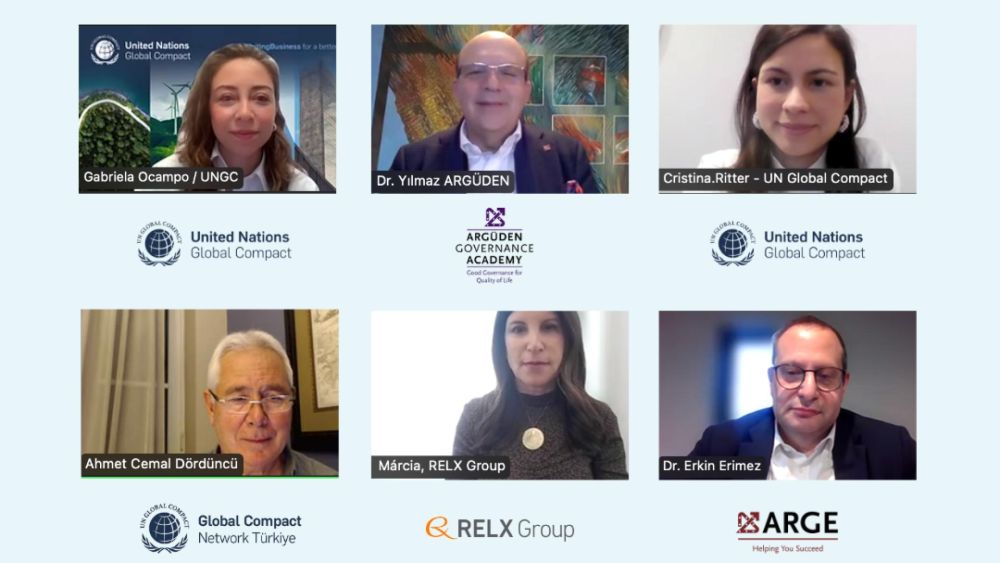Moderated by Gabriela Ocampo, Manager of Transformational Governance, UN Global Compact, the webinar featured insightful discussions from Dr. Yılmaz Argüden, Chair of Trustees, Argüden Governance Academy, Cristina Ritter, Head of Governance and Anti-Corruption, UN Global Compact, Ahmet Dördüncü, Chairman, UN Global Compact Türkiye, Márcia Balisciano, Chief Sustainability Officer, RELX and Dr. Erkin Erimez, Partner, ARGE Consulting.
The webinar emphasized the critical role of good governance principles in achieving sustainable development goals, highlighting how transformational governance fosters long-term value creation by enabling companies to focus not only on financial success but also on the governance of environmental, economic, and social G(EES) factors.
In the panel, moderator Gabriela Ocampo discusses the integration of sustainability, ethical leadership, and governance in business. She addresses why sustainability should be part of decision-making, the importance of ethical leadership, the board's role in adopting transformational governance, and the connection between AI governance and ethical business, highlighting key principles for AI governance.
Key Insights from the Panel
Dr. Yılmaz Argüden, Chair of Trustees of the Argüden Governance Academy, emphasizes that to ensure sustainable success, sustainability must be integrated into the board agenda as a value creation opportunity. Companies need to adopt a broader view of sustainability, considering not only financial outcomes but also environmental, economic, and social G(EES) impacts. It's essential to account for both direct and indirect effects on all stakeholders, expanding the scope of responsibility beyond financial performance. Trust from stakeholders is key, and companies must recognize that their responsibilities extend throughout the entire value chain. While financial capital is easily accessible, intellectual capital requires long-term development. In a nutshell companies must take collective action to foster a culture of trust, which is the foundation of good governance and sustainable development.
Cristina Ritter, Head of Governance and Anti-Corruption of UN Global Compact, defines transformational governance as a framework that combines corporate, sustainable, and global governance. It builds on corporate governance principles like integrity, transparency, and accountability, expanding to include environmental and societal impacts. Transformational governance encourages companies to engage responsibly with their ecosystems, promote peace and justice, and align with global goals like SDG 16. It emphasizes the need for companies to go beyond legal compliance and make ethical decisions that contribute to public institutions, human rights, and sustainability. This approach requires strong ethical leadership and a culture of integrity.
Ahmet Dördüncü, Chairman of the UN Global Compact emphasizes the importance of transforming board responsibilities by integrating sustainability as a core pillar of the company’s strategy. Rather than focusing solely on short-term profit maximization, boards must prioritize long-term value creation that enhances the company’s resilience. This shift in mindset involves a broader perspective, where social impact and environmental considerations become key drivers of decision-making. Companies must create value for all stakeholders, including the supply chain, customers, and society. By adopting transformational governance, companies can craft a compelling narrative that reflects their commitment to sustainable growth and their social impact.
Marcia Balisciano, Chief Sustainability Officer at RELX; highlighted that Good governance must be at the center of Generative AI’s development and application. When used responsibly, this technology has the power to create a positive impact and drive progress toward the SDGs, which should remain a fundamental focus. The principles of transparency, ethical leadership, and accountability are essential in guiding how AI is applied. With these principles in place, AI can transform governance by empowering organizations to make more informed, data-driven decisions, ultimately contributing to a more sustainable and equitable future.
Dr. Erkin Erimez Partner, ARGE Consulting, emphasizes that governance covers all aspects of decision-making. In today’s rapidly changing landscape, transformational governance has become crucial. To foster a sustainable world, it’s essential to adapt and implement governance principles that align with the society, the economy, and the environmental issues. Ethical leadership plays an important role in ensuring that decisions are made with integrity and long-term value in mind. The board, being a critical component of the value chain, is in a unique position to drive meaningful change and accelerate positive impact. Furthermore, regulatory frameworks are key to establishing accountability, but enforcement is equally important to ensure compliance. In this context, artificial intelligence can be a powerful enabler, helping organizations to implement for data based decision making.
Related People
























